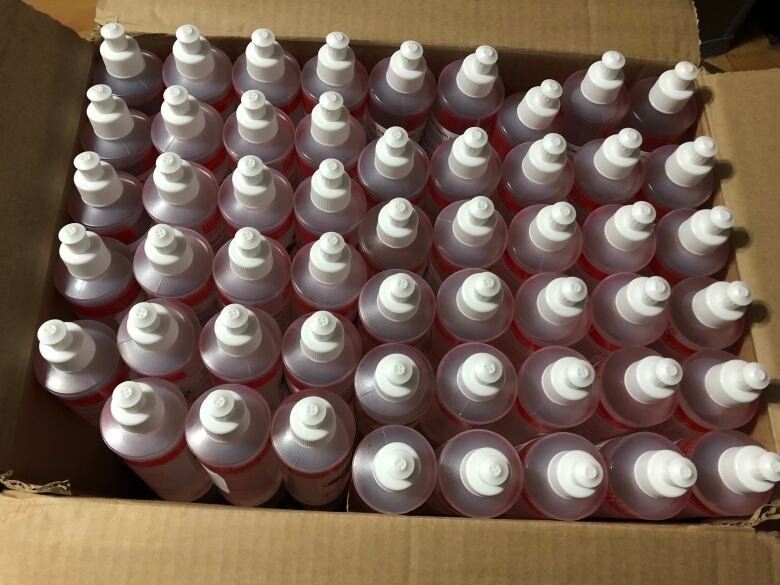Yellowknife company hopes its new hand sanitizer will soon be used by doctors, nurses
'Sometimes it's a lot easier to get things locally,' says 62 Degrees North owner and CEO
A Yellowknife-based company hopes to soon be supplying hand sanitizer for clinical use in hospitals, after getting approval to distribute it in non-clinical settings last week.
62 Degrees North is a company that provides medical services and supplies to northern communities and camps, as well as other places in Canada.
Since getting approval to make and distribute its product to the public last week, the company has distributed it for sale in Inuvik, Hay River, Yellowknife, Fort Smith and Rankin Inlet.
Matt Vincent, the owner and CEO of the company, said his company has already distributed about 2,000 bottles — with 500 going out on Monday alone.
Now, the company is awaiting the final stage of approval so that the product can be available to doctors and nurses on the front lines of the COVID-19 pandemic.
Running low on critical supplies
Vincent said the company never manufactured its own supplies. That changed however, as COVID-19 began to spread and many of their regular vendors across Canada started running low on supplies, including gowns, medical masks and hand sanitizer.
"Hand sanitizer was probably the biggest one that we were running into obstacles with especially ... in N.W.T. and Nunavut, just because we're so isolated."
Vincent began to see other companies across the country, including distilleries, making hand sanitizer, so he researched how to make it, and came across the World Health Organization's recipe.
Approval from the territorial government to buy, manufacture and distribute the product for non-clinical or public use went through last week, said Vincent. Dr. Kami Kandola, the territory's chief public health officer, now has the authority to make a decision under the public health emergency.
The company was also able to get federal approval on the product last week, a process Vincent said can normally take months. But in response to the pandemic, Health Canada has implemented interim expedited licensing to support the manufacturing, packaging and labelling of alcohol-based hand sanitizers.
The approach will be in effect until March 31 of next year, or until a notice from Health Canada says otherwise.
If 62 Degrees North gets final approval on its labelling, it will be able to supply its sanitizer to hospitals and health-care centres for health-care providers to use.
Importance of locally made products
Vincent said he hopes distributing the hand sanitizer as widely as possible can help prevent community spread of COVID-19. As of Monday, all confirmed cases of the disease in the N.W.T. have been travel-related.
The territorial government did not immediately respond to a request about whether the territory's health centres and hospitals are facing hand sanitizer shortages.
Regardless, Vincent said he hopes providing hand sanitizer on a local level can help protect the N.W.T. from global shortages.
"Their normal suppliers are also manufacturing for the rest of the world too ... a shortage in the U.S. or a shortage overseas will have a global effect as well."

He said they will continue making the product as long as they are able to, and while there is a need.
"Sometimes it's a lot easier to get things locally, especially during times like this."
Experts say one of the best ways to prevent spread of COVID-19 is to wash your hands properly with soap and water. If that's not an option, an effective hand sanitizer should have an alcohol concentration of at least 60 per cent.
Health Canada is also cautioning people about the potential health risks of making your own hand sanitizer at home, and does not recommend doing so.